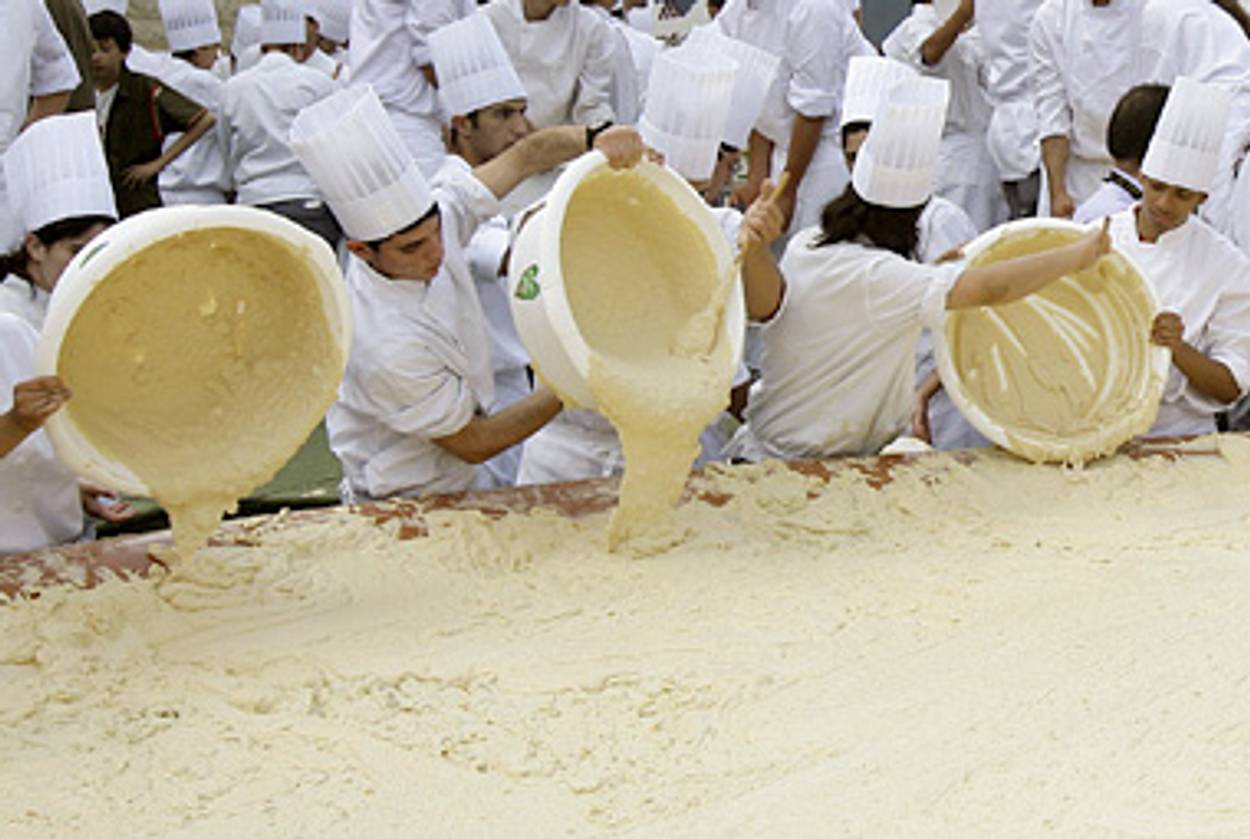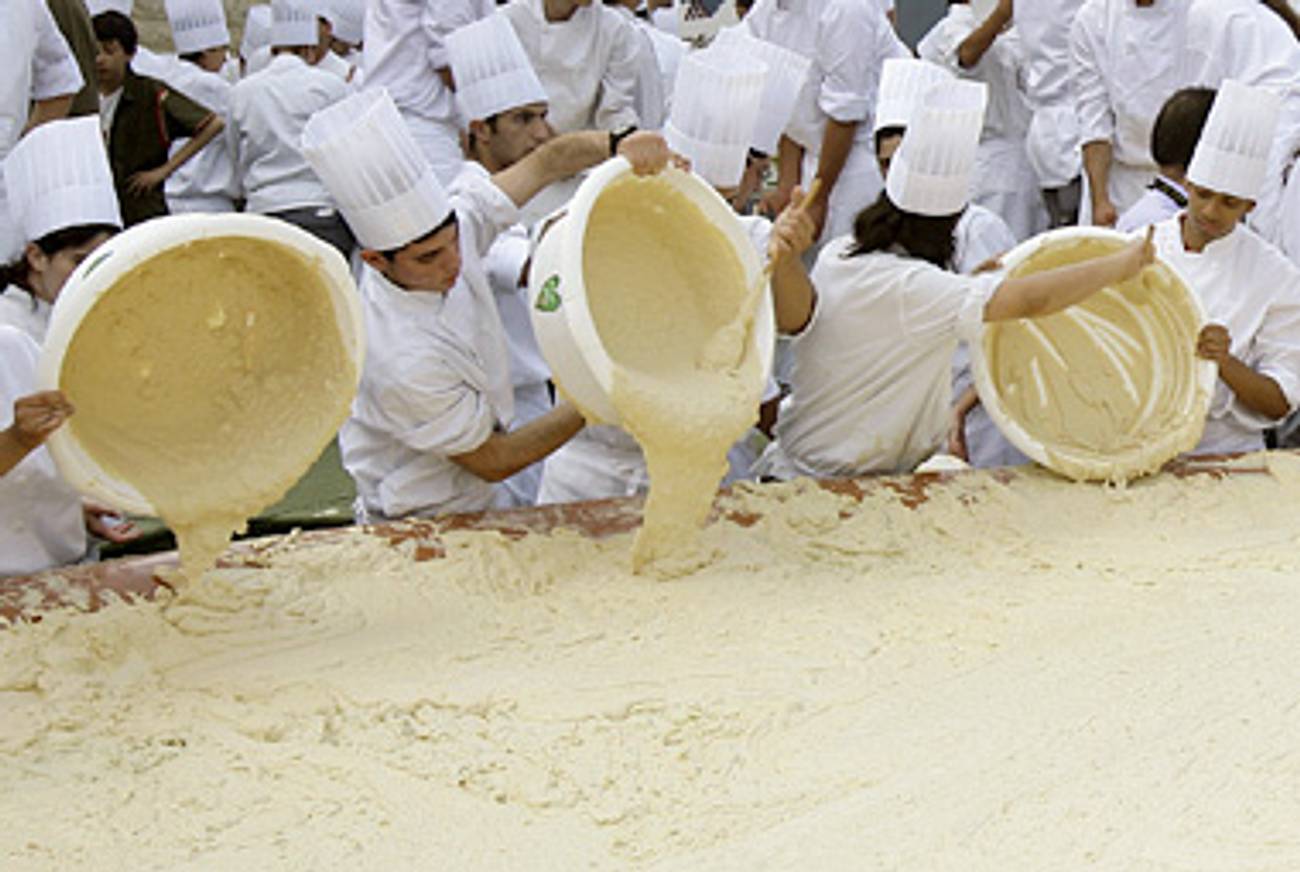Food Fight
Make hummus, not war




Lev and I were on a channel-surfing trip to the children’s television channels when a plate of hummus larger than anything ever seen in the sky over Roswell appeared on the TV screen. A few people held a huge tape measure beside it, and they were surrounded by dozens more who were rejoicing. As a graduate of the Middle East school of inexplicable events, I stayed cool and continued zapping toward the cozy, sane bosom of the Baby Channel. But Lev, who’s 4 and a half, insisted that I go back to the hummus plate and explain why there was so much hummus on it and, furthermore, how come the people around it were so happy.
After a few minutes of staring at that monster-size portion and listening to the commentary, I was able to share some bizarre information with my child: For the past two years, there has been a war going on between Israel and Lebanon to secure the Guinness record for the largest plate of hummus in the world. During those two years, the record changed hands four times, and now the Lebanese had snatched it back from us with a plate of hummus that weighed 10,452 kilograms, more than 22,000 pounds. Lev listened attentively to my learned explanation, and when I finished, he insisted on asking two more questions: First, what’s a “record”? And second, did I really mean to say that the people who made all that hummus weren’t even hungry?
“A record is something you do better than anyone else,” I explained. “Like running faster or jumping higher or remembering things by heart.”
“But making hummus isn’t something like that.” Lev persisted. “They didn’t make anything the fastest or the highest. They just made a lot of hummus.”
“That’s right.” I said, “But even people who don’t know how to do things the fastest or the highest want to break records, so Guinness added other, special records for them to break.”
“So they wouldn’t be sad?” Lev asked.
“Yes,” I said.
That answer satisfied Lev enough for him to agree to turn back to Margalit the Duck Detective. I took advantage of that quality time to do a little Internet surfing and find out exactly what was behind those world records. The culinary battle between Israel and Lebanon, it turns out, is not restricted to the hummus sector. Another no-less-colossal oil-soaked battle was taking place that very moment on, of course, the falafel front. There too the Lebanese had broken the Israeli record for making the most falafel balls in one place and cheated us out of our birthright.
Even more amazing than that idiotic battle were the Israeli commenters online. Some called for a boycott of restaurants that served Lebanese hummus. “Now that Lebanon has shown its true intentions we have to respond unequivocally and send a clear message,” one of them wrote. Others blamed Israel and the government for incomprehensible wishy-washiness. That argument held that we should have been ready for a two-pronged attack of this kind when Israel broke the previous record in January. And one commenter auspiciously calling himself “Someone in the Know,” promised a quick Israeli counter-attack. Rereading all the comments, I sank into a bizarre world, surrounded by anger and pride and precious little irony. Nearly everything was written in earnest. Then the music marking the end of Lev’s television show filtered into the room, returning me to reality.
Lev, who was nearly ready for bed, went to the bathroom. Instead of flushing the toilet, though, he invited me in for a short visit. “Look at my caca,” he said. “Doesn’t it look big?”
“Gigantic,” I said politely.
“A record gigantic?” he asked.
“Could be,” I said, flustered.
“We should call those people with the measuring tape to check it,” Lev said, trying to stop me from flushing.
To my son’s great unhappiness, the Guinness Records Committee wasn’t there when the water swirled down the bowl, but after some tears and a successful bribery attempt in the form of a bottle of chocolate milk with a special sports cap, he calmed down, and the world’s unofficial defecation champion agreed to go to sleep. I, of course, went back to my obsessive Internet search into the world of hummus and falafel record holders.
Turns out that “Someone in the Know” really did know. While I was sabotaging my son’s efforts at immortality, Israel, with America’s unexpected help, had broken the record for the world’s largest falafel ball. A 24-pound ball had been made in New York for a pro-Israel event, which was attended by Omri Casspi, the first Israeli to play in the NBA. Here too, the comments, befitting the importance of the occasion, were patriotic and impassioned. Some warned against complacency and called for Israel to prepare itself for some down-and-dirty Lebanese retaliation.
And that’s when it hit me: These food wars, which, until that moment, had seemed to be the stupidest thing in the world, were actually a brilliant way of bringing peace to the Middle East. Because it was clear that as long as we and our enemies continue to be stressed out, righteous, revenge-seeking people, our sacred national angers will keep burning and igniting bloody battles. We could channel all that negative energy into the culinary arena instead. Then we could finally turn our ploughshares into forks and our spears into chickpea mashers, and, rather than boasting that our army is the strongest one in the world, we could become the proprietors of its greatest kitchen. And if that works, 14 years from now, when my son is drafted, instead of joining a tank crew he could be assigned to a secret army lab in the Negev where he can help create a monstrous pan of shakshuka, made of a trillion eggs, that will break the existing record and smite the rulers of the north African countries.
When all the terrible wars disappear from the region, along with the real threat to our existence, and are replaced by a monument in the shape of a huge piece of pita, we can finally start following the example of all the other civilized peoples in the word and die of an excess of cholesterol.
Translated by Sondra Silverston.
Etgar Keret is a Tel Aviv-based filmmaker and fiction writer. He writes a regular column from Israel for Tablet.
Etgar Keret is a Tel Aviv-based filmmaker and fiction writer.